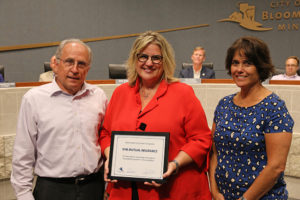
SFM was recently recognized by the City of Bloomington as one of eight local employers who are supportive of breastfeeding mothers in the workplace.
Senior Vice President, Human Resources Jody Rogers and HR Business Partner Mickey Willard accepted the award from Mayor Gene Winstead at an August Bloomington City Council meeting.
The award is part of the city’s Breastfeeding Awareness Month social media campaign to raise awareness of breastfeeding in the workplace laws, and encourage more employers to increase support of working mothers.
SFM was nominated by one of its employees for providing a room for mothers to pump at work, ability to occasionally bring children to work when daycare or school aren’t options, and flexible work hours.
“I am proud that we received this nomination from one of our employees and that our moms feel taken care of and valued by SFM,” said Rogers. “SFM genuinely cares about its employees, and we are passionate about providing a family-friendly environment.”
Willard echoed her sentiments.
“SFM truly affords people the opportunity to have a family and a career. Our continued support of working parents is evident with this award. SFM promotes family first, and supporting new moms with their breastfeeding goals after they return to work is a great example of how we do this,” said Willard.
Several SFM mothers were interviewed by the City of Bloomington for the following video that they hope will encourage more employers to follow suit.
Other Bloomington employers recognized include Edmentum, HealthPartners, Minnesota Gastroenterology, P.A., NorthMarq, Prime Therapeutics, TRIA Orthopaedic Center and UMB Bank.
